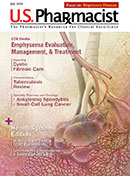American Cancer Society (ACS) researchers said that 713,340 cancer cases and 262,120 cancer deaths in 2019 fall into those categories. They listed modifiable risk factors as:
• Cigarette smoking
• Second-hand smoke
• Excess body weight
• Alcohol consumption
• Consumption of red and processed meat
• Low consumption of fruits and vegetables, dietary fiber, and dietary calcium
• Physical inactivity
• Ultraviolet radiation
• Seven carcinogenic infections: Epstein-Barr virus, Helicobacter pylori, hepatitis B virus (HBV), hepatitis C virus, human herpes virus-8 (also called Kaposi sarcoma herpesvirus), HIV, and human papillomavirus (HPV).
The study, published in the journal CA: A Cancer Journal for Clinicians, found that the leading risk factor by far was cigarette smoking, which contributed to nearly 20% of all cancer cases and 30% of all cancer deaths.
“Despite considerable declines in smoking prevalence during the past few decades, the number of lung cancer deaths attributable to cigarette smoking in the United States is alarming,” said lead author Farhad Islami, MD, PhD, senior scientific director, cancer disparity research at the ACS. “This finding underscores the importance of implementing comprehensive tobacco control policies in each state to promote smoking cessation, as well as heightened efforts to increase screening for early detection of lung cancer, when treatment could be more effective. Interventions to help maintain healthy body weight and diet can also substantially reduce the number of cancer cases and deaths in the country, especially given the increasing incidence of several cancer types associated with excess body weight, particularly in younger individuals.”
In 2018, the authors reported estimates of the number and proportion of cancers attributable to potentially modifiable risk factors in 2014 in the U.S. Now, based on up-to-date relative risk and cancer occurrence data, they estimated the proportion and number of invasive cancer cases (excluding nonmelanoma skin cancers) and deaths overall and for 30 cancer types.
For the study, numbers of cancer cases and deaths were obtained from data sources with complete national coverage, risk factor prevalence estimates from nationally representative surveys, and associated relative risks of cancer from published large-scale pooled or meta-analyses.
The results indicated that in 2019, an estimated 40.0% (713,340 of 1,781,649) of all incident cancers (excluding nonmelanoma skin cancers) and 44.0% (262,120 of 595,737) of all cancer deaths in adults aged 30 years and older in the U.S. were attributable to the evaluated risk factors.
The researchers reported that cigarette smoking was the leading risk factor contributing to cancer cases and deaths overall (19.3% and 28.5%, respectively), followed by excess body weight (7.6% and 7.3%, respectively) and alcohol consumption (5.4% and 4.1%, respectively).
In fact, for 19 of 30 evaluated cancer types, more than one-half of the cancer cases and deaths were attributable to the potentially modifiable risk factors listed in the study. The study team notes that lung cancer had the highest number of cancer cases (201,660) and deaths (122,740) attributable to evaluated risk factors, followed by female breast cancer (83,840 cases), skin melanoma (82,710), and colorectal cancer (78,440) for attributable cases and by colorectal (25,800 deaths), liver (14,720), and esophageal (13,600) cancer for attributable deaths.
“Large numbers of cancer cases and deaths in the United States are attributable to potentially modifiable risk factors, underscoring the potential to substantially reduce the cancer burden through broad and equitable implementation of preventive initiatives,” the authors wrote.
By cancer type, the researchers advised, “The proportion of cases caused by potentially modifiable risk factors ranged from 100% for cervical cancer and Kaposi sarcoma to 4.9% for ovarian cancer and exceeded 50% for 19 of 30 evaluated cancer types.”
In addition to cervical cancer and Kaposi sarcoma, attributable to evaluated risk factors were:
• Melanomas of the skin (92.2%)
• Cancers of the anus (94.2%)
• Larynx (89.9%)
• Lung and bronchus (lung; 88.2%)
• Pharynx (87.4%)
• Trachea (85.6%)
• Esophagus (85.4%)
• Oral cavity (83.7%).
The study noted, “Lung cancer had the largest number of cases attributable to evaluated risk factors in both men (104,410 cases) and women (97,250), followed by skin melanoma (50,570), colorectal cancer (44,310), and urinary bladder cancer (32,000) in men and by breast (83,840), corpus uteri (35,790), and colorectal (34,130) cancer in women.”
“These findings show there is a continued need to increase equitable access to preventive health care and awareness about preventive measures,” explained senior author Ahmedin Jemal, DVM, PhD, senior VP, surveillance and health equity science at the ACS. “Effective vaccines are available for HBV, which causes liver cancer, and HPV, which can cause several cancer types, including cervical, anogenital, and oropharyngeal cancers. Vaccinations at the recommended times can substantially reduce the risk of chronic infection, and consequently, cancers associated with these viruses. HPV vaccination uptake in the United States is suboptimal.”
The content contained in this article is for informational purposes only. The content is not intended to be a substitute for professional advice. Reliance on any information provided in this article is solely at your own risk.






